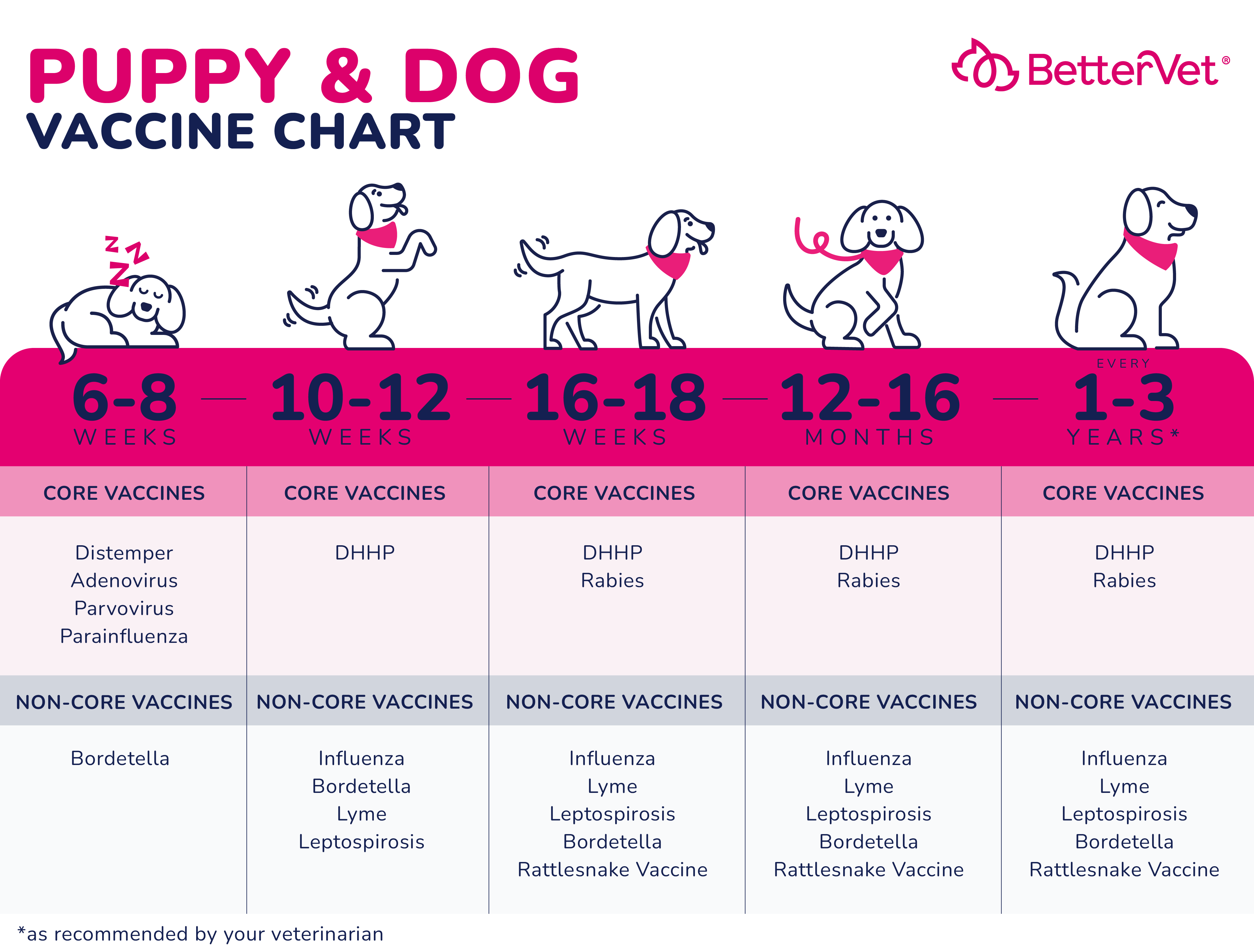Puppy and Dog Vaccinations: Schedule, Types, and Side Effects

Table of Contents
As a veterinarian, I cannot stress enough the importance of regular, preventative vet care for puppies and dogs, which includes adhering to a vaccine schedule for every stage of life.
Keeping your pet up-to-date on essential vaccinations, from puppyhood to adulthood, is key to their long-term health and longevity.
Key Takeaways:
- Dogs need core vaccines for widespread diseases and non-core vaccines based on lifestyle, starting in puppyhood and continuing with boosters.
- Staying on schedule with vaccinations is crucial for preventing serious health issues throughout a dog's life.
- While most vaccine side effects are mild, monitoring for and reporting any severe reactions to a vet is important.
How Dog Vaccines Work
Canine vaccines introduce a small and harmless part of an antigen from a virus or bacteria into your pet’s body. This triggers their immune system to recognize and remember the threat. If your dog is later exposed to the disease, their immune system will respond quickly to fight off the infection.
Common Dog Vaccinations
There are two types of dog vaccines: core vaccines and noncore vaccines (aka lifestyle vaccinations).
Core Vaccines
Core vaccines are universally recommended and considered essential for all puppies and dogs. This is due to the severity of the diseases they protect against.
Here's the list of core vaccines for dogs:
Canine Distemper Virus (CDV) Vaccine
This core vaccine protects against the highly contagious and potentially deadly distemper virus.
Canine Adenovirus (CAV-1 and CAV-2) Vaccine
CAV-1 and CAV-2 shield against adenovirus, which targets the liver, spleen, lungs, and eyes.
Parainfluenza Vaccine
This inoculation provides protection from a virus that causes serious trachea and lung infections.
Parvovirus Vaccine
This vaccine for canines guards against the highly contagious parvovirus, which causes life-threatening gastrointestinal illness.
Rabies Virus Vaccine
This prevents your dog from contracting rabies, a highly contagious disease that is fatal and can spread to humans.
Non-Core Vaccines
Non-core vaccines (also called lifestyle vaccines) are additional vaccinations are often recommended to provide extra protection based on specific risk factors, such as geographical location, health conditions, and lifestyle.
Lifestyle vaccinations for dogs include:
Leptospirosis Vaccine
This vaccine protects against leptospirosis, a bacterial infection that can cause kidney and liver failure, bleeding disorders, and in severe cases, respiratory difficulties.
Leptospirosis can also be passed from dogs to humans. It is often recommended for dogs who spend time in rural areas, the woods, or have access to rivers and streams.
Bordetella Vaccine
Protects against kennel cough and is often recommended if your dog visits dog parks or spends time at a daycare or boarding facility.
Canine Lyme Vaccine
Prevents transmission of bacteria known as Borrelia Burgdorferi from ticks.
Canine Influenza Vaccine (H3N8 and H3N2)
Protects your puppy or dog from contracting the flu from an infected dog.
Rattlesnake Toxoid
Any puppy or dog over four months of age should receive this vaccine that is at risk of a rattlesnake encounter when spending time outside.
Puppy and Dog Vaccination Schedules
Our licensed veterinary team helped us put together this handy chart for both puppy and dog vaccination schedules. Now, pet parents will have a better idea of when to schedule a vaccination appointment based on their pups age.

Puppy Vaccination Timeline
To protect puppies, their vaccinations are scheduled every two to four weeks until they're 16 weeks old, ensuring they build up immunity as maternal antibodies wane.
Keep reading: What Happens During a Puppy's First Vet Visit?
In high-risk areas, extending vaccinations to 20 weeks offers extra safety. This sequence is vital for their early defense against diseases, setting the foundation for a healthy life.
|
Age |
Core Vaccines |
Non-Core Vaccines |
| 6 to 8 Weeks | DHPP*
|
Bordetella |
|
10 to 12 Weeks |
DHPP
|
|
|
14 to 16 Weeks |
DHPP
Rabies |
|
*DHPP is also known as the 5-in-1 vaccine for puppies, which protects against five viruses: Distemper, Adenovirus (Canine Hepatitis), Parainfluenza, and Parvovirus.
Adult Dog Vaccination Timeline
For adult dogs, the vaccination schedule shifts to boosters for core vaccines every one to three years, based on the vaccine type, the dog's health, and local regulations. This helps maintain their immunity against key diseases as they age.
Non-core vaccine boosters are given as needed, determined by the dog's lifestyle, location, and risk of exposure to specific illnesses.
|
Age |
Core Vaccines |
Non-Core Vaccines |
| 12 to 16 Months | DHPP
Rabies |
|
|
Every 1 to 3 Years |
DHPP
Rabies |
|
Side Effects of Dog Vaccines
Just like humans, dogs can have adverse reactions to vaccines and other medications. In my experience as a veterinarian, side effects from dog vaccines are usually mild.
However, if your dog’s symptoms do not resolve quickly and include any of the severe reactions listed below, you should consult your veterinarian immediately.
Mild Vaccine Reactions
- Mild lethargy
- Low-grade fever
- Swelling and discomfort in the injection area
- Temporary loss of appetite
- Low-grade fever
Rare Vaccine Side Effects
- Vomiting
- Diarrhea
Severe Symptoms After Vaccination
If you notice any of the following symptoms in your dog after they received vaccinations, immediately contact your veterinarian:
- Difficulty breathing
- Hives
- Extreme lethargy
- Persistent vomiting or diarrhea
- Seizures
- Swelling on the face, nose, or around the eyes
- Temporary loss of appetite
Should My Pet Be Seen by a Veterinarian?
1. Have you noticed changes in your pet’s appetite?
2. Does your pet have diarrhea or loose stools?
3. Have you noticed changes in your pet’s thirst/water consumption?
4. Is your pet having accidents in the house?
5. Is your pet pacing and unable to settle?
6. Is your pet panting more than usual?
7. Is your pet whining or vocalizing more than usual?
8. Is your pet shaking more than usual?
9. Is your pet hiding or avoiding physical contact more than usual?
10. Is your pet more lethargic and sleeping more than usual?
11. Are you concerned about changes in your pet’s behavior?
12. Is your pet scratching their ears?
13. Is your pet licking their paws more than usual?
14. Does your pet have a rash?
15. Is your pet moving more slowly than usual or having a harder time getting up or down?
View Results
Should My Pet Be Seen by a Veterinarian?
1. Have you noticed changes in your pet’s appetite?
2. Does your pet have diarrhea or loose stools?
3. Have you noticed changes in your pet’s thirst/water consumption?
4. Is your pet having accidents in the house?
5. Is your pet pacing and unable to settle?
6. Is your pet panting more than usual?
7. Is your pet whining or vocalizing more than usual?
8. Is your pet shaking more than usual?
9. Is your pet hiding or avoiding physical contact more than usual?
10. Is your pet more lethargic and sleeping more than usual?
11. Are you concerned about changes in your pet’s behavior?
12. Is your pet scratching their ears?
13. Is your pet licking their paws more than usual?
14. Does your pet have a rash?
15. Is your pet moving more slowly than usual or having a harder time getting up or down?
Share Quiz
Conclusion
Adhering to a vet-approved vaccine schedule, combined with routine care such as grooming, exercise, healthy nutrition, and regular wellness exams, all help lay a foundation for your furry friend's healthy and happy life.
At BetterVet, we’ll collaborate with you to create a customized vaccination schedule based on your pet’s needs. Our veterinarians are all Fear Free™ certified to minimize your pet’s anxiety and provide vet care services in the comfort of your home.
Save the Date and Vaccinate Your Pet at Home
Protect your pet's health without the stress of a trip to the vet. Preventative care is safer and hassle-free with BetterVet.
Frequently Asked Questions
How are dog vaccines administered?
Common dog vaccines are usually administered via subcutaneous (under the skin), although some are given intranasally.
How much do dog vaccines cost?
Vaccinations are typically administered during a Pet Wellness exam and range between $20 and $85 per shot. Prices range according to breed, health needs, and location.
Why are vaccinations important for puppies?
Canine vaccinations protect puppies from serious and potentially life-threatening diseases.
What's the difference between core and non-core vaccines?
Core vaccines are essential and recommended for all dogs due to the widespread risk of serious diseases. In contrast, non-core vaccines are optional and depend on specific factors like lifestyle and environment.
Can I delay or skip vaccines for a healthy puppy?
No. Delaying or skipping vaccines increases their risk of contracting preventable diseases.
Can my puppy go outside before all shots are done?
It's best to avoid high-risk environments like dog parks, doggie daycares, boarding, and grooming facilities until your puppy has completed the full vaccination series to minimize the risk of exposure to infected animals or environments.





